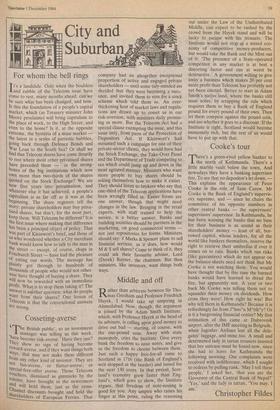City and
For whom the bell rings
t's a landslide. Only when the boulders and rubble of the Telecom issue have come to rest, many months ahead, can we be sure what has been changed, and how. Is this the foundation of a people's capital market, which (as Treasury minister John Moore proclaims) will. bring capitalism to the place of work, to the High Street, and even to the home? Is it, at the opposite extreme, the hysteria of a mass market the latest in a series of patriotic bubbles, going back through Defence Bonds and War Loan to the South Sea? Or shall we find that Telecom shares have come drearily to rest where most other privatised shares have preceded them — in the strong- boxes of the big institutions which now own more than two-thirds of the shares quoted on the Stock Exchange? We are now five years into privatisation, and whatever else it has achieved, a people's capitalism is as far off as it was at the beginning. The share registers tell the story: private shareholders may buy priva- tised shares, but don't, for the most part, keep them. Will Telecom be different? It is the first issue where making that difference has been a principal object of policy. That was part of Kleinwort's brief, and those of us who wondered whether a City merchant bank would know how to talk to the man in the street — except, of course, chaps in Fenchurch Street — have had the pleasure of eating our words. The message has Plainly got through to hundreds of thousands of people who would not other- wise have thought of buying a share. They will now be rewarded with an immediate Profit. What is to stop them taking it? The answer is another question: what do people want from their shares? One lesson of Telecom is that the conventional answers are wrong.






















































 Previous page
Previous page